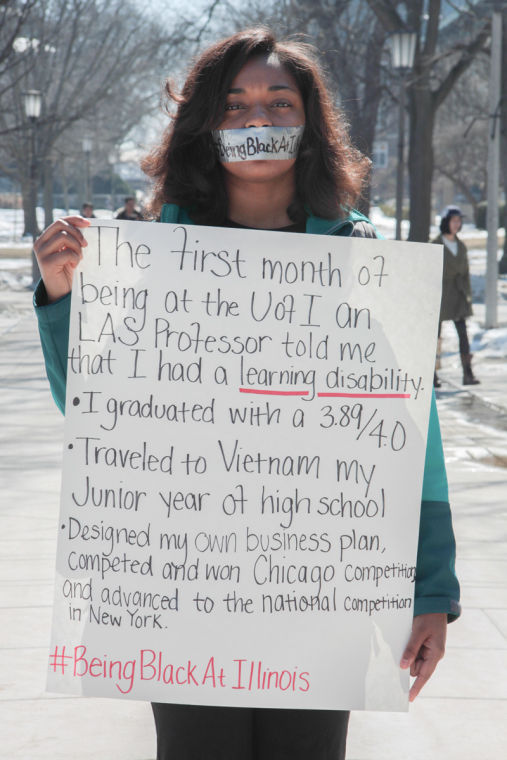Students involved in silent protest meet with faculty to address inclusivity issues
Mar 12, 2014
Last updated on May 11, 2016 at 06:23 a.m.
Several students who took part in the silent protest Being Black at Illinois met with University officials on Monday in an effort to address race issues on campus.
During the meeting, students voiced their concerns to Renee Romano, vice chancellor for student affairs, and Charles Tucker, vice provost for undergraduate education and innovation. They expressed that they want more than a discussion — they want action.
Students were primarily concerned that the University does not require any form of diversity education for graduation, an issue that Romano said falls in Tucker’s purview.
“I always think it’s important to hear from students about their experiences because until you hear it directly from a person, you can’t really appreciate what they’re talking about,” Romano said.
Get The Daily Illini in your inbox!
Helen Neville, counseling psychology chair in the College of Education, said issues of racial microaggression — a theory that interaction between people of different races can be interpreted as acts of nonphysical aggression — can affect students psychologically. She said she supports students in their efforts to address racial climate issues on campus.
“I know how difficult and challenging that could be,” she said. “As a faculty (member), I am committed to creating a campus climate in which all students feel as though they are respected and valued members of the community.”
Neville said it is important that students begin to articulate and define their experiences. This would consequently educate the campus by showing that racism still happens, and it could begin to bridge the gap between racial communities on campus, she said.
“We need to push for ways to establish meaningful connections and interactions across racial groups that create a personal, meaningful relationship,“ Neville said.
To be more informed, Neville recommends students take courses dealing with topics of diversity, a suggestion students made to Romano and Tucker.
Some of Neville’s research focuses on black racial identity. She has found that experiences with racial microaggression can have a negative effect on a person’s psychosocial well-being. Through meta-analysis, a method that hopes to identify patterns within studies, she has found that there is a relationship between perceived racism and higher levels of depression.
Neville is interested in finding ways to overcome this. She said addressing the concern through activism and providing social support can be helpful.
“It’s important to address it (the issue of racial microagression) … to acknowledge that it actually happens,” she said. “People try to create an ideology that race doesn’t matter, it’s not important. What we know, and another part of our research, is that it’s not true.”
Neville also said the University should focus on increasing the representation of the black community.
Black students currently comprise about 5 percent of the campus’ student population, according to the Division of Management Information. The most recent data compiled in the 2007 cohort from DMI states that black students hold the lowest six-year retention rate at 71.9 percent.
The students involved in Being Black at Illinois will continue sharing experiences of racial acts of microaggression through posters while their mouths remain taped shut on the Quad for the rest of the week.
Neville said the silent statement helps to increase people’s awareness about students’ experiences, as it puts a face to some of the experiences so that people can develop a sense of empathy.
“It’s empowering for students to name their experiences,” she said. “It can inspire (people) … to also take a stand.”
Romano said the group of students agreed to have further conversations regarding inclusivity. The students plan to regroup and discuss their next step. She expressed that listening to their experiences and getting a sense of their experiences on campus was a good idea.
Jessica can be reached at [email protected].






